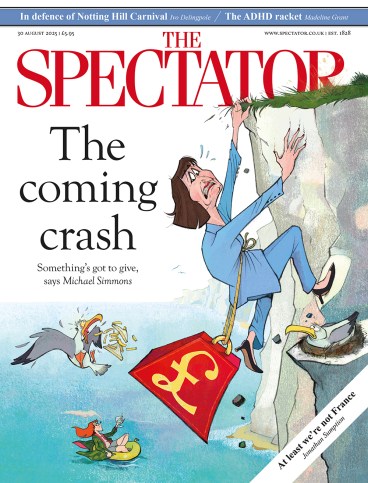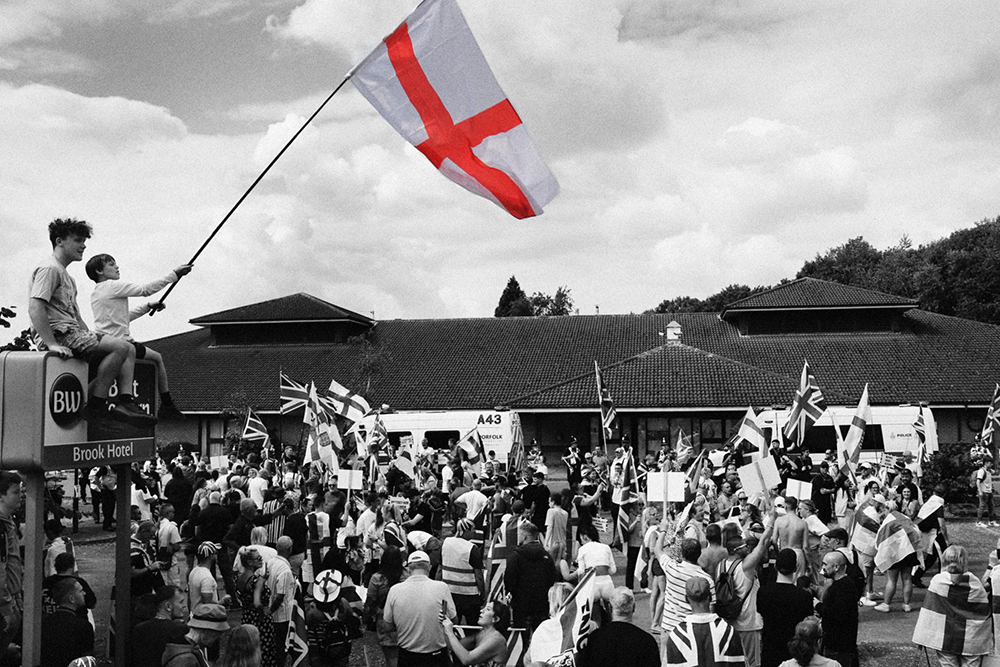
‘I heard you want your country back. Ha, shut the fuck up!’ So yelped rap-punk duo Bob Vylan on stage at Glastonbury in June. That televised set became notorious for other reasons – for Vylan’s chant of ‘Death, death to the IDF’, which cost the group their agent, a string of shows and, presumably, another Glasto appearance. But part of me thinks that Britain wouldn’t have faced such a restive summer, rocked by grassroots patriotic protests, were it not for that cretinous tirade against the nation. That and the triumphant return of Oasis, who aren’t afraid of a flag.
Everything that has happened since has felt like a defiant middle finger to the Bobs and the anti-pleb sentiment so often pumped out by the arts-schooled elites. The peaceful protests outside migrant hotels claimed their first victory in the Essex town of Epping, after a court ordered that the Bell Hotel should be blocked from housing asylum seekers. The Operation Raise the Colours campaign, rallying tracksuited blokes to go out with ladders in the dead of night to tie Union and England flags to lampposts. Reform’s rise in the polls, which has forced Keir Starmer’s Labour party, the political wing of human rights law, to pretend that it cares about controlling the borders.
Nationhood is back, whether you like it or not. Protest in Britain had long been synonymous with the time-rich middle classes – the people who go to Glastonbury. It had become a quaint means of self-expression, an opportunity for comfortable people to show how enlightened they are. Not any more. We are witnessing a revolt from below, and no wonder. Illegal migration is a class issue. An analysis in 2021 found that one in four state-supported asylum seekers resides in just ten local authorities. Nine of them are among the most deprived in the UK.
Tolerating illegal migration – pretending that all of those entering on small boats are refugees fleeing war and oppression, when many are just fleeing France in the hope of a job in the British black market – works for those who exist in more privileged settings. It means an easy supply of virtue and Deliveroo. But it means something different to those in areas which are fraying economically and socially, now accommodating hundreds of unvetted men about whom we know little, until one is charged with a sexual offence.
When protests kicked off outside the Britannia International Hotel in Canary Wharf recently, commentators seemed dumbfounded. Why should this chintzy financial hub become a site of unrest just because a few dozen migrants were to be housed among its glittering skyscrapers? That only showed how little the media and political classes understand their own country. The Britannia sits where Canary Wharf turns into the Isle of Dogs proper, where glass and steel give way to the concrete of council estates.
These protests are as much about culture and values as they are about economics. The old east London working class of Tower Hamlets, the working-class-done-good of the more leafy parts of Essex, and the small-c conservatives of provincial England – what unites them is a belief in nation, in borders, in the glue of national identity. They lack the politically correct programming that compels metropolitan liberals to ignore the evidence of their own eyes where immigration and integration are concerned.
We are witnessing a revolt from below, and no wonder. Illegal migration is a class issue
The old slurs of ‘racist’ and ‘far right’ have been flung the protestors’ way, but they’re not sticking – not least because some of their protests have been markedly multiracial. Reporting at one of the Canary Wharf demos, I met mixed-race families, even recently arrived legal migrants, who were incensed by the migrant hotel.
Britain feels like it’s having its own gilets jaunes moment, the French rebellion against Emmanuel Macron’s green fuel taxes which morphed into a full-blown populist insurgency. From 2018 to 2020, hundreds of thousands of people from ‘peripheral’ France, those on the outskirts of cities who had to drive to live and work, blockaded roads. Their symbol was the hi-vis yellow vest French motorists are required to keep in their cars. Tricolores also fluttered at the marches.
It was about much more than fuel prices. The gilets jaunes spoke to the sense that the working-class and lower-middle-class had been pushed to the edges of French life, economically, socially and politically as well as geographically – away from the centres of culture and commerce. As Christophe Guilluy, the great theorist of the French periphery, puts it, this wasn’t just about registering opposition to Macron’s eco-policies. This was a demand for a seat at the table. A way to say ‘we exist’.
Like Britain’s flag-hoists and hotel demos, this was a bottom-up, online-driven movement, independent of the organised right or left. And like their British cousins, the gilets jaunes forced the French state to respond, and not just with riot gear and rubber bullets. Macron eventually scrapped the hated fuel-tax rise, promised a minimum-wage hike and embarked on a nationwide town-hall listening tour.
When the history of this tumultuous era is written, the gilets will go down as pioneers of a new form of street populism that has reverberated well beyond France. The tractor protests in the Netherlands and across the Continent, sparked by the EU’s immiserating regulations on farm emissions. The truckers’ occupation of Ottawa, against then Canadian prime minister Justin Trudeau’s Covid mandates. And now the hotel protestors of England. The demands may have differed, but all reflected a profound rupture between rulers and ruled, and all came wrapped in flags.
Macron is now dealing with yet another twist on the phenomenon. He could be facing a fresh autumn of discontent in France thanks to the ‘bloquons tout’ (‘block everything’) movement, calling for roadblocks, strikes and boycotts on 10 September. It sprung up on social media in response to the announcement of swingeing budget cuts and the elimination of two national holidays (a particular sore spot). This disparate coalition appears to comprise yellow-vest veterans, left-wingers and parts of the radical right.
Starmer – another technocratic dud in office but not in power – should see signs of his own fate in Macron’s. What Brits have been denied at the ballot box – action on illegal immigration – they are demanding on the streets. They are asserting their sovereignty, national and popular. And they’re winning. The Bell ruling has sparked dozens more protests across the country. Even Labour councils are considering legal actions to shutter their migrant hotels and quell these rebellious voters. They want their country back. And you know what, Bob? They might just get it.








Comments